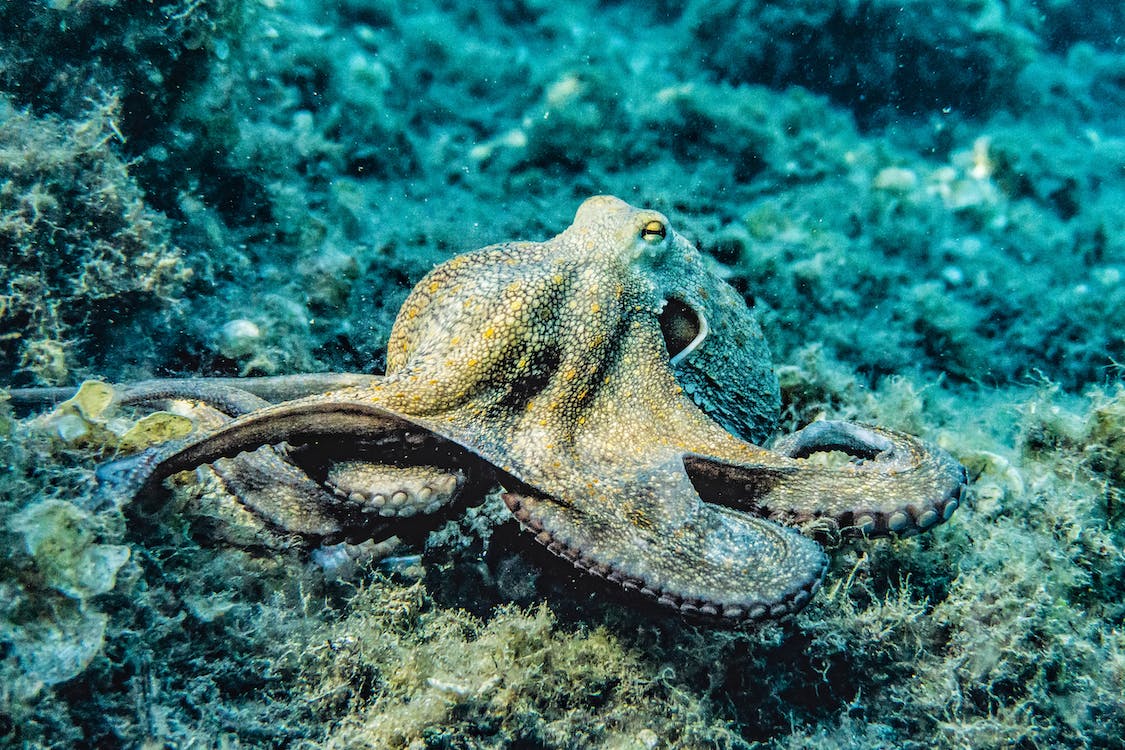Summary | Excerpt | Reviews | Beyond the Book | Read-Alikes | Genres & Themes | Author Bio

A Novel
by Ray NaylerThis article relates to The Mountain in the Sea
 In Ray Nayler's The Mountain in the Sea, the characters Ha Nguyen and Evrim discuss at length the extraordinary neurological traits of octopuses and how they are likely the key to unlocking a model of consciousness completely alien to humans. Ha mentions, for one, that two-thirds of an octopus's neurons are not even in its brain but spread out across all of its eight limbs; the tentacles each do their own thinking and receive commands from the central brain only some of the time. To loosely borrow a human phrase, we might be led to believe, based on this information, that the octopus's left hand might not know what the right hand is thinking, or the next right hand, or the next…
In Ray Nayler's The Mountain in the Sea, the characters Ha Nguyen and Evrim discuss at length the extraordinary neurological traits of octopuses and how they are likely the key to unlocking a model of consciousness completely alien to humans. Ha mentions, for one, that two-thirds of an octopus's neurons are not even in its brain but spread out across all of its eight limbs; the tentacles each do their own thinking and receive commands from the central brain only some of the time. To loosely borrow a human phrase, we might be led to believe, based on this information, that the octopus's left hand might not know what the right hand is thinking, or the next right hand, or the next…
In neurobiology, this uniquely decentralized nervous system is referred to as "embodied intelligence." The term is taken from "embodied organization," a holistic approach in the field of robotics to designing robots that must be able to process massive amounts of information in order to independently adapt to their environment. According to this model, an octopus exhibits intelligent behavior through an interactive relationship between its environment, the materials at its disposal, and the structure of its entire body as a whole — brain, tentacles and all. Moreover, this embodied organization of intelligent behavior, which has been noted to rival the cognitive abilities of vertebrates, evolved largely as a result of the octopus's unusual body structure.
To say that octopuses are unusual is perhaps an understatement. As the character Ha explains in the book, two-thirds of an octopus's approximately 500 million neurons (roughly the same number as a dog) are located in the limbs, amounting to around 40 million per tentacle. In effect, each of the octopus's arms is a semi-independent "satellite brain" that collects its own data from the external environment and issues its own orders regarding sophisticated muscle movements and tasks; the only time there is communication with the central brain is to relay back important neural information or receive general directives, such as when to go hunt for food.
Research has suggested that the embodied intelligence of octopuses is an evolutionary answer to a highly vulnerable body design that must efficiently process as much information as possible in order to adapt and survive in a variety of different environments, each with its own array of predators and sources of nourishment. Without the protective shell some of their cephalopod ancestors possessed, it is believed that hostile environments eventually forced octopuses to develop complex cognitive abilities for which having an advanced nervous system is crucial.
The octopus's remarkable degree of achievable movement requires a constant high-level transfer of neurons that relay information back and forth between the brain and muscles; it is part and parcel of a multi-limbed, boneless body that is capable of complex behaviors including shapeshifting and changing color as a means of camouflage. The only known nervous system design effectively suited to meeting the demands of such an unusual body type is a decentralized organization in which the processes that drive intelligent behavior consist of interactions between the brain, the octopus's body structure, the semi-independent "satellite brains" equipped across its limbs, and the environment. This layout works because it lessens the central brain's burden by outsourcing much of the neural processing directly to the outer limbs — it is primarily via the tentacles that an octopus takes in information about the outside environment.
As a result of this extraordinary evolutionary development, the octopus has become a highly intelligent organism capable of exhibiting excellent memory skills and communicating moods like aggression by changing its body color. It is also believed that an octopus can understand cause and effect and adjust its behavior in anticipation of future events. Equipped with the cognizance of a world that exists separately from and outside of itself, the octopus excels at tracking prey in hiding thanks to its awareness of object permanence. In light of such complex comprehension skills, it is no wonder that Ray Nayler imagines octopuses to be the first metaphorical "aliens we encounter [that] will rise to greet us from the sea" in his novel.
Filed under Medicine, Science and Tech
![]() This "beyond the book article" relates to The Mountain in the Sea. It originally ran in October 2022 and has been updated for the
May 2023 paperback edition.
Go to magazine.
This "beyond the book article" relates to The Mountain in the Sea. It originally ran in October 2022 and has been updated for the
May 2023 paperback edition.
Go to magazine.
Your guide toexceptional books
BookBrowse seeks out and recommends the best in contemporary fiction and nonfiction—books that not only engage and entertain but also deepen our understanding of ourselves and the world around us.